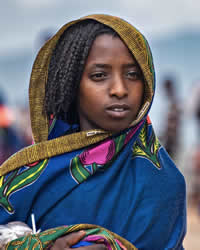Oromo, Borana in Kenya

Photo Source:
Rod Waddington - Flickr
Creative Commons
|
Send Joshua Project a map of this people group.
|
| People Name: | Oromo, Borana |
| Country: | Kenya |
| 10/40 Window: | No |
| Population: | 302,000 |
| World Population: | 1,944,000 |
| Primary Language: | Oromo, Borana-Arsi-Guji |
| Primary Religion: | Islam |
| Christian Adherents: | 8.00 % |
| Evangelicals: | 2.00 % |
| Scripture: | Complete Bible |
| Ministry Resources: | Yes |
| Jesus Film: | Yes |
| Audio Recordings: | Yes |
| People Cluster: | Oromo |
| Affinity Bloc: | Horn of Africa Peoples |
| Progress Level: |
|
Introduction / History
The various Oromo people groups are the largest, most widely dispersed groups in Ethiopia. They also reside in Kenya, Somalia and Egypt. Composed of approximately a dozen tribal clusters, these peoples prefer just the term "Oromo" when speaking of themselves. Nearly all of these peoples speak mutually intelligible dialects of a language called "Borana-Arsi-Guji Oromo". They have subgroups divided by dialect. That includes the Borano Oromo. Although they retain similarities in their descent system, Oromo peoples differ considerably in religion, lifestyle and political organization.
The Oromo were probably pushed westward from the Horn of Africa by the Somali during the tenth century. Together with the Amhara and the Tigrai, they dominated the government and military classes of the Ethiopian Empire. In the 1700s and 1800s, these peoples became a prominent force in Abyssinian (Ethiopian) politics. During the nineteenth century, they converted to Islam.
What Are Their Lives Like?
Oromo have a reputation for being easygoing and sociable. They are famous in Ethiopia for their musical abilities. They value hospitality and almsgiving, especially to relatives and friends. Yet they have a harsher side; they have a tradition of being warlike.
The Oromo are herdsmen with a warrior tradition. They determine a man's status by the number of livestock he owns. Virility and male attributes are considered desirable, with bravery and war skills being stressed. Riding, spear-throwing, and fighting are also emphasized. Although warfare against enemies is honored, peace within the group is demanded.
The Oromo live in rural areas where they make a living primarily from raising animals along with some farming. The typical dwelling is a tukal, or a circular hut made of acacia branches covered with grass mats. The cone-shaped roof has an opening that allows smoke to escape. Villages are made up of 10-80 families. Their staple diet includes durra (a cereal grain), maize, beans, rice, milk, meat, and wild fruits. Coffee and tea are both popular beverages.
The Oromo family is headed by an authoritarian father who has the right to expect total obedience. Men usually have only one wife, and children are considered a necessity. The more children and grandchildren a man has, the greater his prestige.
One basic value of the Oromo is tokuma, which is identification with the group. The religious, social, political and economic life of the Oromo revolves around this. Cooperation is central to this system, especially in work arrangements.
Some Oromo have moved to the towns, attracted by employment opportunities and modern schooling. Others have entered national security forces, the industrial labor force, or fields of trade, transportation and education.
What Are Their Beliefs?
The majority of the Oromo are Muslim; however, their traditional religion is still practiced by a minority of the population. These ethnic religionists worship a supreme being named Waqa. Wadaja feasts are organized on various occasions, and livestock is sacrificed in Waqa's honor. Today, these feasts reflect a Muslim influence.
Many people still believe that objects such as trees, springs, and rocks have spirits. It is also believed that spirits called jinn may take possession of people. While fasting during Ramadan (the Muslim holy month) is observed by most adults, celebration of other Muslim festivals is limited.
Among the Borana Oromo, there is a small believing minority thanks to the work of Presbyterians and other Christian groups. The small Borana church needs trained disciplers and church planters to reach their entire community and take them to the light of Jesus.
What Are Their Needs?
Few Oromo villages have electricity. Medical care is lacking, and access to medicine is limited. Their water supply comes from rivers and springs.
Translations of Bible portions began as early as 1870. Yet they took almost 100 years to be completed. The New Testament was finished first in 1979, with the whole Bible being completed in 1995. However, this version uses a different alphabet than the one currently being taught. There are oral gospel materials including the JESUS Film and gospel recordings that can bring the gospel message to the Borana Oromo community.
Prayer Points
Pray that the Lord of the Harvest would call vibrant African Christians to disciple the Borana Oromo.
Ask the Holy Spirit to grant wisdom and favor to the church planters who are focusing on the Oromo.
Ask God to anoint the gospel as it goes forth via radio in their area.
Pray that God will give the Oromo believers boldness to disciple their people.